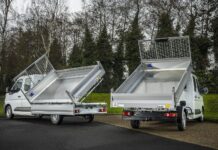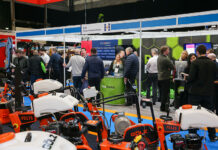BELLSHILL-based Active Access is pushing ahead with ambitious expansion plans under new owners Euro Mechanical Handling (EMH).
In recent months the business has relocated to new premises, taken on four extra staff members and snapped up around 40 new machines, including ten Hinowa tracked booms from Scottish Hinowa dealer APS.
Andrew McCusker, who founded the company 14 years ago and turned it into a respected player in the growing access market, sold the rental firm late last year. He’s still currently involved in a background advisory role and is proud of the business he created from scratch.
“We launched Active Access in 2003,” he said. “We’d identified a gap in the market. I was in a commercial glazing business and we were using more and more powered access to do curtain walling. We started hiring a lot and I saw an opportunity to set something up.
“We continued to grow the business over several years and tried to carve out a niche for ourselves. We tried to be a friendly company and get close to our customers. We tried to be the hire depot through the wall – a bolt on to customers’ own businesses.
“We had no experience in powered access. In fact, I had no experience in management whatsoever. Naivety is a fantastic thing. I would take enthusiasm over knowledge any day of the week. When you bring naivety to something, it’s quite refreshing because you can find new things.”
Andrew surrounded himself with experienced staff and Active Access began making serious inroads into the rental access industry. When the recession struck in 2008, the firm scaled back from 16 employees to six. However, the business managed to turn a profit and set itself up for expansion once the market picked up again.

Andrew explained, “The recession was an interesting time. I went on the hire desk myself. We went right back to basics. We still had the same amount of machines to put out on hire. We actually added to the fleet because we started to make money and bought niche products like spiders and various bits that took us into slightly new avenues. We consolidated the staffing and expenditure. The business got stripped back to real basics. Our turnover halved but we went from making a £100,000 loss to making a £100,000 profit.
“We geared ourselves up to really take advantage when the market recovered and invested in our systems.
“In 2014 we again decided to consolidate and sold a lot of the old kit off. The business had to adapt to suit the climate and suit our own business. It’s amazing how quickly 14 years pass and how quickly something goes from being a brand new asset to an old asset in the blink of an eye.”
Last year, Andrew took the opportunity to sell the business, having felt the need to embark on a new challenge.
Leigh Baker is now sales and operations director. He believes that with the strength of EMH behind the company, the future looks very bright indeed.
He said, “Seref Zengin (EMH managing director) and I were put together by a mutual friend. Access was something he was interested in doing. It was just at the right time with Andrew looking to leave the business. The deal’s been done and transformation is now taking pace.
“Some of the machines were starting to get a bit old looking. Since Seref’s came in we’ve spent a lot of money on a refurb programme to make sure that all the kit and current equipment is refurbished back to a high standard. We want to give the perception of good, honest, reliable machines and a decent service. Being a local company, we can give that service instantly rather than having to go through the usual processes of having to go up the chain to get anything done. Seref’s very hands-on and has enjoyed being involved.”

Seref told Project Plant his aim is to concentrate on the specialised side of the access hire sector, rather than “just doing what everybody does”.
“The attraction (to buy Active Access) was there because this was a pretty healthy business with a good track record,” he said.
Since the takeover, the Active Access fleet has grown to almost 200 machines. Leigh said he’s been “scouring the market” for quality equipment. “It’s always going to be a work in progress and we’ve always got the capacity to add to our fleet,” he said. “One of the biggest things we’ve done is purchase a lot of the tracked machines. I’ve got a lot of experience running tracked machines with a previous company I was involved with. Whilst they’re still fairly new in the hire market, people are becoming more aware of what they can do and the possibilities.
“As Seref said, it’s about offering something that little bit different and keeping up to speed with the latest and most modern technology that’s going to help people get to where they need to be.
“The investment has been huge. I believe we are probably the largest independent provider of tracked access platforms, or we certainly will be within the next couple of months when the last batch gets delivered.”
The latest Hinowa booms the company has taken delivery of include 17.75, 20.10 and 26.14 machines. “I’ve good experience with Hinowa,” Leigh added. “There’s a very good backup service. They’ve got the latest technology on them, even to the point where we’re getting different coloured tracks to go indoor/outdoor. The new 26 that we’ve got is the biggest machine they do – it was only brought out within the last year. Again, we’re one of the first in the UK (to have that) and I’d stick my neck on the line and say we’ve probably got the biggest fleet of 26 metres.
“We also offer secondary guarding, which has become fairly prevalent on diesel booms. I don’t know if anyone else offers secondary guarding on the tracked machines. That’s something we’ve ordered with our commitment to safety and best practice.
“It’s something we can basically retrofit to the machine as and when required for site-specific work. All the machines have been ordered with internal/external tracks.”
According to Leigh, the recent investment is “just the start of it”.

“We aim to grow the business through more lucrative contracts,” he added. “We’re getting into more difficult areas and using our expertise. We’ve got the knowledge to get into any awkward areas and go out, do site surveys and advise people if they can get to certain areas what machines are going to be suitable.
“We’ve had jobs in castles where we’ve had to take machines up steps and over walls. We’ve had machines over hedges and fences to get into gardens. We do a lot of work with painting contractors. We tend to find these guys go in when buildings are complete and access is not always viable – especially when they’re going into sensitive areas like slabbed and grassed areas.
“These machines are very lightweight. The ground pressures on them are second to none.
“The majority of our machines are out on hire just now. Things are looking positive; we’ve started to deal with some very interesting projects. We’ve got some jobs coming up shortly on very prestigious buildings.”
Active Access also offers IPAF and PASMA training amongst other things. “We also provide a MEWPs for Managers course and excavator and dumper tuck training, CSCS and forklift driver training,” Leigh said. “It’s an extensive list. We have two full-time trainers. That’s all part of expanding the business. When working at height regulations came out in 2005, everything changed for everybody.”
Since being acquired by EMH, Active Access has seen staff numbers rise from 10 to 14. Leigh said that, due to the firm’s reputation and future plans, there’s been no shortage of experienced workers keen to join. “The business has been around a long time,” he said. “It’s well established, the name is known within the industry and through a lot of people in the Central Belt. We’ve brought someone in to do compliance/health and safety. There’s good experience there. It’s not the case that we’re just a small backwater company. We’ve actually had people from big multi-national companies with lots of experience keen to join us once they see our plans and aspirations for where we’re going. We’ve almost completed the jigsaw.
“(The market) is very competitive. If you go back even ten years, there were a lot of national players and independents that were not up this neck of the woods. Since then it has at least doubled or trebled in machine terms, on the ground. A lot of that is with new legislation coming through. What we tend to find is that because we’re a friendly, local company you’ll always get an answer from us. Our customer retention is really good compared to a lot of other places.”
Leigh said that customer attention is pivotal to their on-going success and, given that many of their competitors run similar machines, that extra engagement is where Active Access hope to stand out.
“There’s no point chasing or winning new business and then letting people down,” he explained. “Word of mouth is very important to us as well and we tend to find we get a lot of business that way through other contractors speaking to each other about the level of service they had.
“In terms of our competitors, we’re all in the same boat. We all run similar-ish machines. They’re all mechanical plant so they’re all susceptible to breakdowns and issues. We find it’s how you deal with those issues and how you solve problems and react – that’s what keeps your customer attention. 90% of our business is repeat business.
“We look to add new customers who will work with us as well. It’s very easy to go out and drop the rates and get customers. Anyone can do that. What we like to do is work with the customers to complete a project to the satisfaction of both parties, because it is a two-way street. I’ve been in the hire game for over 20 years. It’s normally a one-way street where the hire company gets a bashing all the time. It’s always their fault, they’ve done everything wrong, it’s never the customer. However, if you liaise closely with the customer – and that comes down to good relations with them, speaking with them, being honest with them – in my experience, and I learnt the hard way when I was much younger, honesty is the best policy in this game. Be up front with people and you tend to find you get respect back and achieve things and get repeat business. A lot of our customers will go and recommend us, which is better than any marketing or cold-calling you can do.”
High profile projects Active Access has supplied kit to include the Sir Chris Hoy Velodrome in Glasgow and St Giles’ Cathedral in Edinburgh. The majority of the firm’s work is carried out in Central Scotland, though it is geared up to tackle projects further afield if applicable. We get involved in a lot of areas where they’ve not been able to find solutions – churches, older buildings, historical stuff,” Leigh added. “You’ve also got new, flashy buildings. A lot of these buildings leak and they’ve all got nice landscapes so they need something to go in and do the job quickly and efficiently and get out again. We’ve supplied to major events and extreme sports. We’ve got a big sporting thing coming up later this year on TV. It’s interesting getting into these sort of areas and it really does boost the profile of the company as well when people see the name out there.”
One of the biggest drivers of Active Access’s expansion plans is the move from a depot in Hamilton to a two-acre site in Bellshill’s Righead Industrial Estate. With Seref also owning land at the back of the site, which he currently rents out on short-term contracts, there’s potential for even more space in the future if fleet numbers necessitate that.
Leigh explained, “We’ve got a lovely hard-standing concrete area and a workshop suitable for either indoor or outdoor working. We have enough height in the roof to do the training.
“Having everyone under the same roof is also a big advantage. Logistically, we’re in a fantastic position here, especially when the roadworks are finished. Our times will improve and hopefully things will get a bit easier. We’ve got a blank canvas here. Even simple things like power points for charging machines (are more convenient). We can plan out exactly where everything’s going to be. It’s all about putting things into place to make the business run smoothly.
“In the old depot, there was a container business and a hire business right across from us. There was also a lorry business. You tended to find sometimes it was tight coming into the industrial estate. If people were arriving at the same time, it could be a bit of a nightmare. Here we’ve not got anybody else. We can do whatever we need to do here to make things work.
“We’re right on the main road. We’re also getting some signs made up so people will see that as they pass, which is another good selling point.”
Having worked in the sector for over 20 years, Leigh is ideally placed to comment on how he sees the industry evolving. In his opinion, the demand for powered access is only going to get greater. “The industry has certainly matured a lot over the past few years,” he said. “A lot more professionalism has come into it. Everything’s more controlled. Health and safety is prevalent to everything so we make sure the machines are decent and meet all the proper legislation and paperwork. That’s where this industry is going so if you’re on top of your compliance work, everything else does fall into place.
“More and more people are using access for different solutions now that they’re realising there are different machines available. Certainly with the tracked machines, going back ten years none of that technology was available. It was always scaffolding that would go up; that was your only option. So it’s about trying to educate people that there are alternatives. The statistics prove that if you’re working at height, the safest method is via an access platform. Moving forward, if anyone’s doing risk assessment method statements, it states that you’ve got to do work by the safest means possible.”
And that, Leigh concluded, can only mean good news for businesses involved in the access sector.












